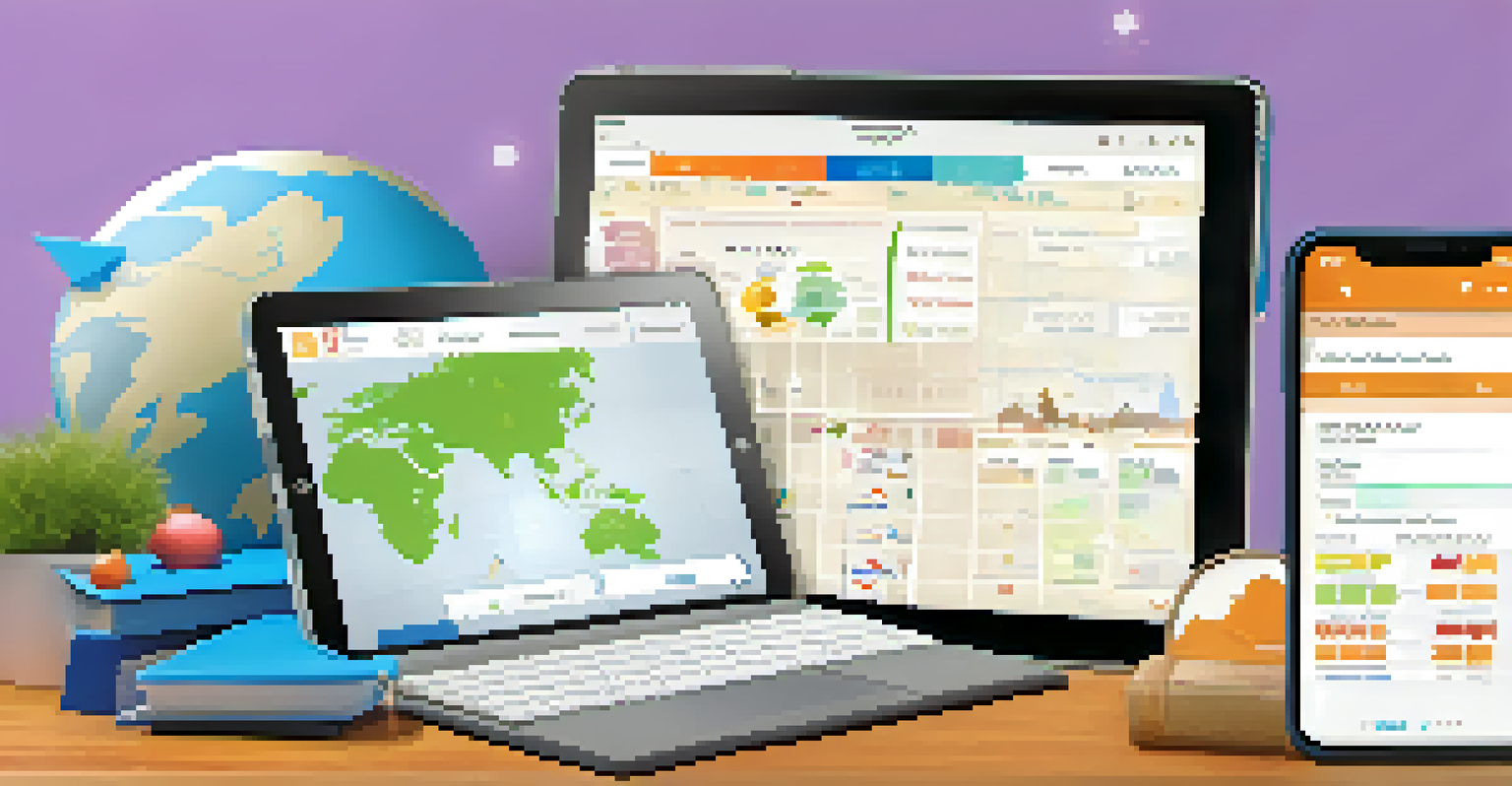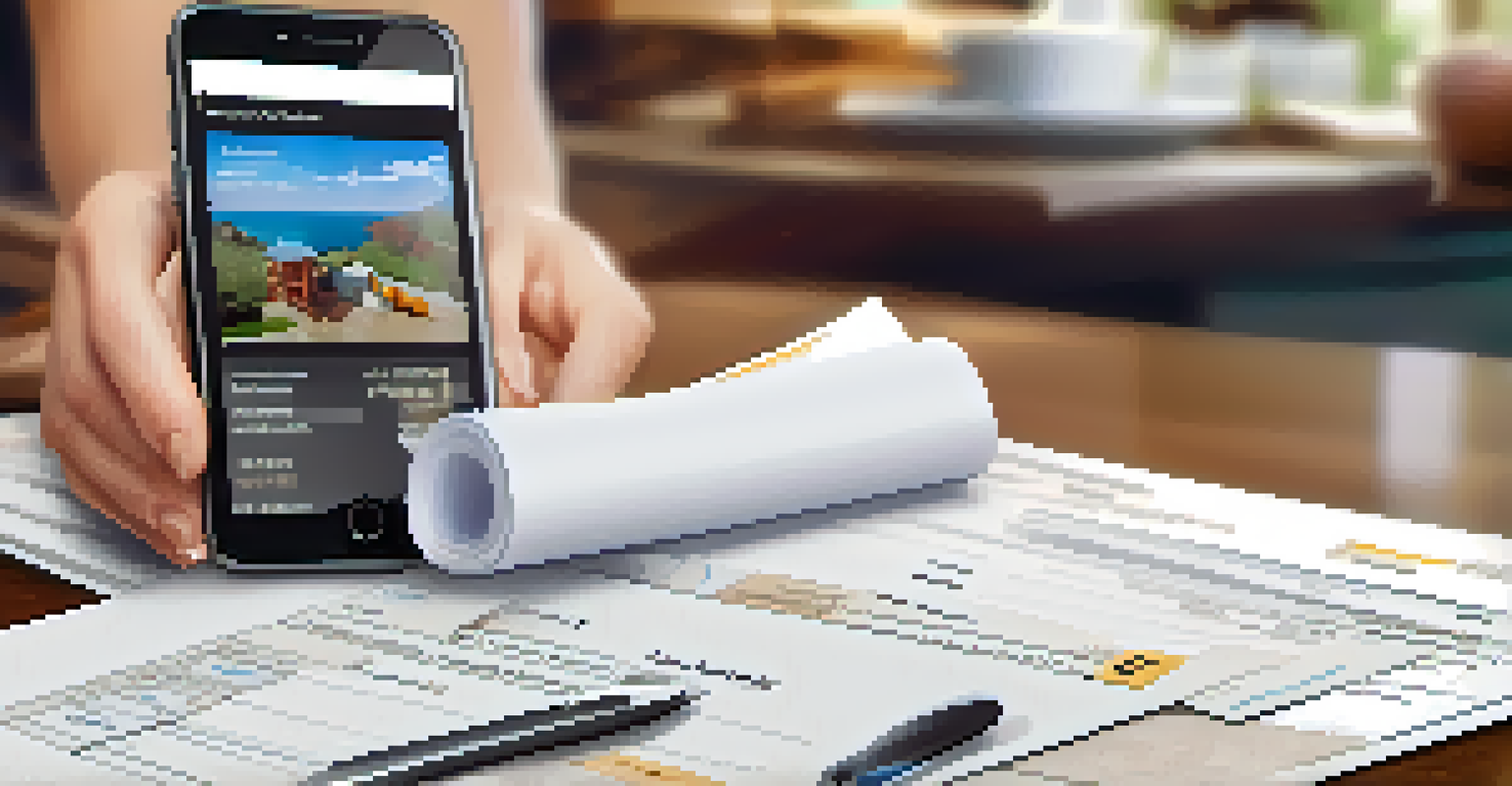Travel Budgeting: How to Track Expenses Effectively

Understanding the Importance of Travel Budgeting
Travel budgeting is more than just a financial exercise; it’s the foundation for a stress-free trip. When you set a budget, you’re giving yourself the freedom to enjoy your travel experiences without the nagging worry of overspending. Think of it as a roadmap for your journey, guiding you through the winding paths of expenses.
A budget is telling your money where to go instead of wondering where it went.
By outlining your budget, you prioritize what matters most—whether it's splurging on a fancy dinner or saving for a unique local experience. This clarity helps you make informed choices, allowing you to stretch your dollars further. Additionally, tracking your spending can reveal patterns, helping you adjust your future budgets.
Overall, a well-planned budget not only enhances your travel experience but also sets the stage for future adventures. After all, the more you save and manage your finances wisely, the more you can travel!
Setting a Realistic Travel Budget
Creating a realistic travel budget starts with understanding your overall financial situation. Take a moment to assess your income, savings, and any other expenses you’ll have while traveling. This financial snapshot will help you determine how much you can allocate toward your trip without sacrificing your day-to-day needs.

Next, consider the costs associated with your destination. Research the average prices for accommodation, food, transportation, and activities. Websites like Numbeo or budget travel blogs can provide valuable insights into what to expect, allowing you to create a more accurate estimate.
Budgeting Ensures Stress-Free Travel
A well-planned travel budget allows you to enjoy your trip without the anxiety of overspending.
Lastly, don’t forget to include a buffer for unexpected expenses—because let’s face it, surprises happen! A good rule of thumb is to add an extra 10-20% to your budget for those little extras that can pop up.
Using Tools to Track Your Expenses
In today’s digital age, there are countless tools at your disposal to help track your travel expenses. Budgeting apps like Mint and TravelMapper allow you to input your expenses in real-time, ensuring you stay on top of your spending. These tools often provide visual graphs and reports that can help you see where your money is going, making it easier to manage.
It's not about how much money you make, but how much money you keep, and how hard it works for you.
If apps aren’t your thing, a simple spreadsheet can do wonders. With programs like Google Sheets or Excel, you can create a customized budget tracker that suits your needs. Plus, you can access it from anywhere, even on the go, with your smartphone.
By consistently updating your expense tracker, you’ll gain valuable insights into your spending habits, which can help you make adjustments during your trip. This proactive approach not only keeps you accountable but also empowers you to make informed decisions.
Categorizing Your Travel Expenses
One effective way to track your expenses is by categorizing them. Break down your budget into specific categories such as accommodation, food, transportation, activities, and souvenirs. This will give you a clearer picture of where your money is being spent and help you identify areas where you might be overspending.
For instance, if you notice that your dining expenses are significantly higher than planned, you can adjust by seeking out more budget-friendly restaurants or cooking some meals yourself. This not only saves money but can also be a fun and engaging way to experience local culture.
Track Spending with Tools
Utilizing budgeting apps or spreadsheets helps you monitor expenses in real-time and adjust as needed.
Additionally, categorizing expenses can aid in future trip planning. By reviewing past categories, you can set more realistic budgets based on previous experiences, making your next trip even smoother.
Keeping Track of Receipts and Invoices
One of the simplest yet most effective ways to track your travel expenses is by keeping all your receipts and invoices. Whether they’re physical or digital, these documents serve as proof of your spending and can help you stay organized. Consider using a dedicated envelope or a digital app like Expensify for easy storage.
At the end of each day, take a few minutes to sort through your receipts and input them into your budget tracker. This not only keeps your records up-to-date but also allows you to reflect on your daily spending, making adjustments as necessary.
By maintaining a habit of tracking and organizing receipts, you’ll have a comprehensive overview of your expenses. This practice not only simplifies budgeting but also provides a clear account for any future reference.
Making Adjustments on the Go
Even with the best planning, travel can sometimes throw a curveball. Unexpected expenses can arise, and it’s essential to adapt your budget accordingly. Keep an open mind and be flexible—this is part of the adventure!
If you find yourself overspending in one category, look for ways to cut back in another. For example, if unforeseen transportation costs arise, you might choose to skip that pricey dinner out. This kind of quick thinking can help you stay within your overall budget.
Reflect Post-Trip for Improvement
Reviewing your budget after the trip provides insights that can enhance future travel planning and financial management.
Remember, the goal is to enjoy your trip while keeping your finances in check. By being proactive and adjusting your budget as needed, you can still have a fantastic travel experience without breaking the bank.
Reflecting on Your Travel Budget After the Trip
Once your adventure concludes, take some time to reflect on your travel budget. Reviewing your actual expenses against your budget can provide valuable insights into your spending habits. This is an opportunity to learn from your experience and refine your budgeting skills for future trips.
Consider creating a post-trip report that details your expenses by category, highlighting where you stayed on budget and where you overspent. This not only helps you understand your financial behavior but can also guide your travel planning for the next adventure.

Ultimately, reflecting on your budget can turn each trip into a learning experience. With each journey, you’ll become more adept at managing your travel expenses, leading to more enjoyable and financially responsible travel in the future.